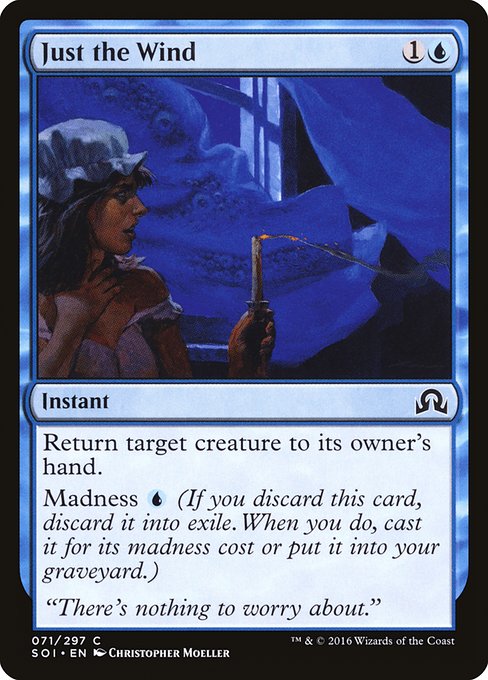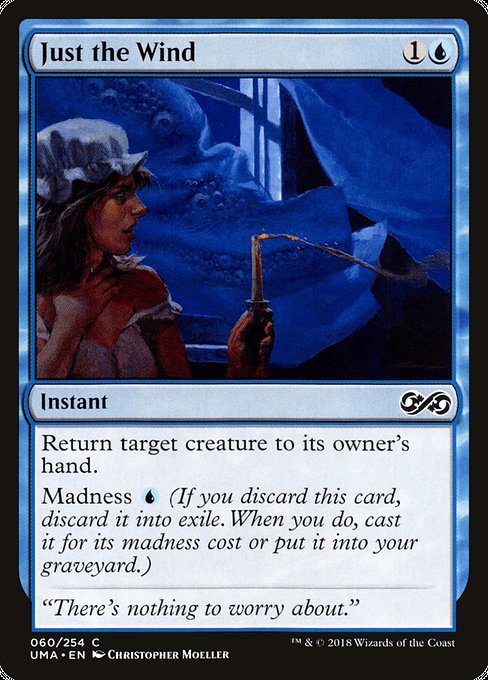standard
future
historic
gladiator
pioneer
explorer
modern
legacy
pauper
vintage
penny
commander
brawl
alchemy
paupercommander
duel
oldschool
premodern
Rulings
Cards are discarded in a Magic game only from a player’s hand. Effects that put cards from a player’s library into that player’s graveyard do not cause those cards to be discarded.
Casting a spell for its madness cost doesn’t change its mana cost or its converted mana cost. You just pay the madness cost instead.
A spell cast for its madness cost is put onto the stack like any other spell. It can be countered, copied, and so on. As it resolves, it’s put onto the battlefield if it’s a permanent card or into its owner’s graveyard if it’s an instant or sorcery card.
Effects that cause you to pay more or less for a spell will cause you to pay that much more or less for its madness cost, too.
If you choose not to cast a card with madness when the madness triggered ability resolves, it’s put into your graveyard. You don’t get another chance to cast it later.
If you discard a card with madness while resolving a spell or ability, it moves immediately to exile. Continue resolving that spell or ability—the card is not in your graveyard at this time. Its madness trigger will be placed onto the stack once that spell or ability has completely resolved.
When you cast a card with madness, it was still discarded. If it was discarded to pay a cost, that cost is still paid. Abilities that trigger when a card is discarded will still trigger.
Madness works independently of why you’re discarding the card. You could discard it to pay a cost, because a spell or ability tells you to, or even because you have too many cards in your hand at the end of your turn. You can’t discard a card with madness just because you want to, though.
If you discard a card with madness to pay the cost of a spell or activated ability, that card’s madness trigger (and the spell that card becomes, if you choose to cast it) will resolve before the spell or ability the discard paid for.
Casting a spell for its madness cost doesn’t change its mana cost or its converted mana cost. You just pay the madness cost instead.
A spell cast for its madness cost is put onto the stack like any other spell. It can be countered, copied, and so on. As it resolves, it’s put onto the battlefield if it’s a permanent card or into its owner’s graveyard if it’s an instant or sorcery card.
Effects that cause you to pay more or less for a spell will cause you to pay that much more or less for its madness cost, too.
If you choose not to cast a card with madness when the madness triggered ability resolves, it’s put into your graveyard. You don’t get another chance to cast it later.
If you discard a card with madness while resolving a spell or ability, it moves immediately to exile. Continue resolving that spell or ability—the card is not in your graveyard at this time. Its madness trigger will be placed onto the stack once that spell or ability has completely resolved.
When you cast a card with madness, it was still discarded. If it was discarded to pay a cost, that cost is still paid. Abilities that trigger when a card is discarded will still trigger.
Madness works independently of why you’re discarding the card. You could discard it to pay a cost, because a spell or ability tells you to, or even because you have too many cards in your hand at the end of your turn. You can’t discard a card with madness just because you want to, though.
If you discard a card with madness to pay the cost of a spell or activated ability, that card’s madness trigger (and the spell that card becomes, if you choose to cast it) will resolve before the spell or ability the discard paid for.
Rulings
Cards are discarded in a Magic game only from a player’s hand. Effects that put cards from a player’s library into that player’s graveyard do not cause those cards to be discarded.
Casting a spell for its madness cost doesn’t change its mana cost or its converted mana cost. You just pay the madness cost instead.
A spell cast for its madness cost is put onto the stack like any other spell. It can be countered, copied, and so on. As it resolves, it’s put onto the battlefield if it’s a permanent card or into its owner’s graveyard if it’s an instant or sorcery card.
Effects that cause you to pay more or less for a spell will cause you to pay that much more or less for its madness cost, too.
If you choose not to cast a card with madness when the madness triggered ability resolves, it’s put into your graveyard. You don’t get another chance to cast it later.
If you discard a card with madness while resolving a spell or ability, it moves immediately to exile. Continue resolving that spell or ability—the card is not in your graveyard at this time. Its madness trigger will be placed onto the stack once that spell or ability has completely resolved.
When you cast a card with madness, it was still discarded. If it was discarded to pay a cost, that cost is still paid. Abilities that trigger when a card is discarded will still trigger.
Madness works independently of why you’re discarding the card. You could discard it to pay a cost, because a spell or ability tells you to, or even because you have too many cards in your hand at the end of your turn. You can’t discard a card with madness just because you want to, though.
If you discard a card with madness to pay the cost of a spell or activated ability, that card’s madness trigger (and the spell that card becomes, if you choose to cast it) will resolve before the spell or ability the discard paid for.
Casting a spell for its madness cost doesn’t change its mana cost or its converted mana cost. You just pay the madness cost instead.
A spell cast for its madness cost is put onto the stack like any other spell. It can be countered, copied, and so on. As it resolves, it’s put onto the battlefield if it’s a permanent card or into its owner’s graveyard if it’s an instant or sorcery card.
Effects that cause you to pay more or less for a spell will cause you to pay that much more or less for its madness cost, too.
If you choose not to cast a card with madness when the madness triggered ability resolves, it’s put into your graveyard. You don’t get another chance to cast it later.
If you discard a card with madness while resolving a spell or ability, it moves immediately to exile. Continue resolving that spell or ability—the card is not in your graveyard at this time. Its madness trigger will be placed onto the stack once that spell or ability has completely resolved.
When you cast a card with madness, it was still discarded. If it was discarded to pay a cost, that cost is still paid. Abilities that trigger when a card is discarded will still trigger.
Madness works independently of why you’re discarding the card. You could discard it to pay a cost, because a spell or ability tells you to, or even because you have too many cards in your hand at the end of your turn. You can’t discard a card with madness just because you want to, though.
If you discard a card with madness to pay the cost of a spell or activated ability, that card’s madness trigger (and the spell that card becomes, if you choose to cast it) will resolve before the spell or ability the discard paid for.
Your collection? Your decks?
Want to manage your collection and/or create decks?


 0
0
 0.07€
0.07€
